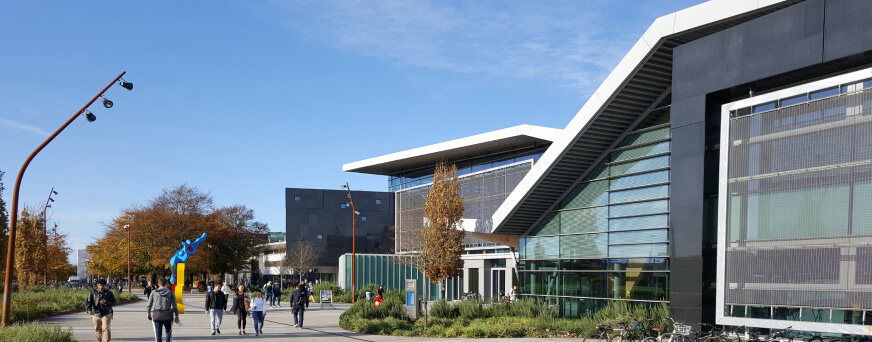Explore University of McCordsville’s Eligibility Criteria for Students Worldwide
High School Diploma, GED or equiv. International Education
144 Hours
4 Year (Self-Paced) Program
24
The course explores philosophic and artistic heritage of humanity expressed through a historical perspective on visual arts, music, and literature. Topics include myth, literature, art, music, television, cinema, and the theater. Also discussed are provocative issues in the humanities - religion, morality, happiness, death, freedom, and controversies in the arts.
Social and Cultural Geography considers why geography matters to the analysis and understanding social relations, cultural identity and social inequality. Course examines how social life is structured at a variety of scales with respect to ethnicity, industries, services, urban patterns, and resources of world as a whole.
English Composition provides you with rhetorical foundations that prepare them for academic and professional writing. You will learn the strategies and processes that successful writers employ as you work to accomplish specific purposes. You will develop skills in writing unified, coherent, well-developed essays using correct grammar and effective sentence structure.
College Algebra provides an overview of the fundamental concepts of algebra: an understanding of the general concepts of relation and function; and the ability to solve practical problems using algebra.
World Religions course offers the broadest coverage of world religions as they exist today; helping you understand the ideology behind the many religions that strive today. While it is impossible to cover all religions, it does cover those of the vast majority of people.
Evenly balanced between theory and applications, this course shows you how to establish an ethical theory and how to apply it to a range of specific moral issues. This course examines ethical problems in such areas as mercy killing, personal relations, business, sexuality, medicine, and the environment.
This course introduces the origins and historical development of art. Emphasis is placed on the relationship of design principles to various art forms including but not limited to sculpture, painting, and architecture. Upon completion, you should be able to identify and analyze a variety of artistic styles, periods, and media.
This course provides the mathematical foundation for an introductory calculus course. In addition to a brief review of basic algebra, the course covers equations and inequalities; functions, models, and graphs; polynomial and rational functions; exponential and logarithmic functions; trigonometric functions; and trigonometric identities and equations.
This course is an introductory study of the human body, including the basic structure and function of the major organ systems (nervous, endocrine, circulatory, reproductive, etc.) and the effects of diet, exercise, stress and environmental change on human health.
World History course present the big picture, to facilitate comparison and assessment of change, and to highlight major developments in world's history. This course emphasizes the global interactions of major civilizations so that you can compare and assess changes in the patterns of interaction and the impact of global forces.
This course defines industrial and systems engineering; describing its place in the business world and offering a wide picture of the functional areas with some solution techniques.
This course helps you in acquiring an engineering mindset; providing you with the core knowledge and skills all engineers need to succeed. It helps you in seeing the world through the eyes of an engineer; looking at how engineers apply science and technology to solve problems facing society today.
Latest developments in engineering discusses about the latest trends in engineering which keep on adding new subjects and new versions of old subjects and techniques.
In this course, you will find a lot of the e-engineering basics presented in an easy-to-follow and friendly style, you will also get the latest on internet, web page design, and much more-stuff barely on the horizon a couple of years ago that now dominates the online landscape.
Advanced fields in engineering is the analysis and design of continuous-time and discrete-time systems using time domain and frequency domain techniques. The course includes important Structural Dynamics, Free Vibration, Dynamic Analysis And Response To Linear Systems and Reduction Of Degree Of Freedom
This course provides an integrated introduction to electrical engineering and computer science, taught using substantial laboratory experiments with mobile robots. Our primary goal is for you to learn to appreciate and use the fundamental design principles of modularity and abstraction in a variety of contexts from electrical engineering and computer science.
The course is based on introduction to the civil engineering profession and its role in the society; creative thinking and critical thinking as integral parts of the engineering decision process. The course discusses about important materials such as concrete materials, wood, iron and steel.
The traditional approach to teaching mechanical engineering has been to cover either mechanics or thermofluid mechanics. In response to the growing trend toward more general modules, Foundations of Mechanical Engineering provides a unified approach to teaching the basic mechanical engineering topics of mechanics, the mechanics of solids, and thermofluid mechanics.
This course explores the materials and processes used in agricultural engineering, including soil and water management, farm machinery, and post-harvest technology. Students will learn about the properties and applications of various materials used in agriculture.
This course focuses on the foundational elements of agricultural engineering, covering the principles and applications in crop and livestock production, post-harvest technology, and renewable energy. It aims to equip students with the essential knowledge and skills needed for modern agricultural practices.
This course covers the dynamics and control of agricultural machinery and systems. Students will learn about the principles of dynamics, control theory, and their applications in agricultural engineering.
This course focuses on the design and analysis of structures used in agriculture, including buildings, storage facilities, and other infrastructure. Students will learn about the principles of structural engineering and their applications in agriculture.
This course introduces students to the principles of systems engineering as applied to agricultural projects. It covers the entire lifecycle of agricultural systems, from requirements definition to system validation.
This course introduces students to the field of agricultural engineering, covering fundamental concepts, tools, and techniques used to improve agricultural production and sustainability.
| Tuition Fee Breakdown 1 | Cost |
|---|---|
| BACHELORS DEGREE | $31,680 |
| Medical Insurance | $0.00 |
| Personal Expenses | $0.00 |
| Study Materials | $0.00 |
| Food Cost | $0.00 |
| Total Tuition Fee | $31,680 |
At University of McCordsville, we champion the convergence of affordability and opportunity. Our steadfast commitment to accessible education guarantees that high-quality learning is accessible to all. By eliminating financial obstacles, we grant students the freedom to thrive without the burden of overwhelming tuition costs, empowering them to carve out a bright and promising future.

| Topics Covered in This Course: | |||||||||||||||||||||||||||||||||
|
| Topics Covered in This Course: | |||||||||||||||||||
|
| Topics Covered in This Course: | |||||||||||||||||||||||||||||||||||
|
| Topics Covered in This Course: | |||||||||||||||||||||||||||||||||
|
| Topics Covered in This Course: | |||||||||||||||||||||||||||||||
|
| Topics Covered in This Course: | |||||||||||||||||||||||||||||||||||||
|
| Topics Covered in This Course: | |||||||||||||||||||||||||||||||||||||
|
| Topics Covered in This Course: | |||||||||||||||||||||||||
|
| Topics Covered in This Course: | |||||||||||||||||||||||||||||||||
|
| Topics Covered in This Course: | |||||||||||||||||||||||||||||||||||||||||||||||||||||||||||||||||||
|
| Topics Covered in This Course: | |||||||||||||||||||||||||||||||||||||||||
|
| Topics Covered in This Course: | |||||||||||||||||||||||||
|
| Topics Covered in This Course: | |||||||||||||||||||||||||||||||
|
| Topics Covered in This Course: | |||||||||||||||||||||||||||
|
| Topics Covered in This Course: | |||||||||||||||||||||||||||||||||||||||||||||||
|
| Topics Covered in This Course: | |||||||||||||||||||||||||||||||||||||||
|
| Topics Covered in This Course: | |||||||||||||||
|
| Topics Covered in This Course: | |||||||||||||||||||||||||||||||||||||
|
| Topics Covered in This Course: | |||||||||||||||
|
| Topics Covered in This Course: | |||||||||||||||
|
| Topics Covered in This Course: | |||||||||||||||
|
| Topics Covered in This Course: | |||||||||||||||
|
| Topics Covered in This Course: | |||||||||||||||
|
| Topics Covered in This Course: | |||||||||||||||
|
“Every minute spent under the guidance and supervision of the University of McCordsville was worth it for a student like me.”

“An amazing online platform, supportive staff, and valuable career resources. I highly recommend the University of McCordsville.”

“Scholarship opportunities, personalized support, and impactful learning. I am grateful for my journey at the University of McCordsville!”
